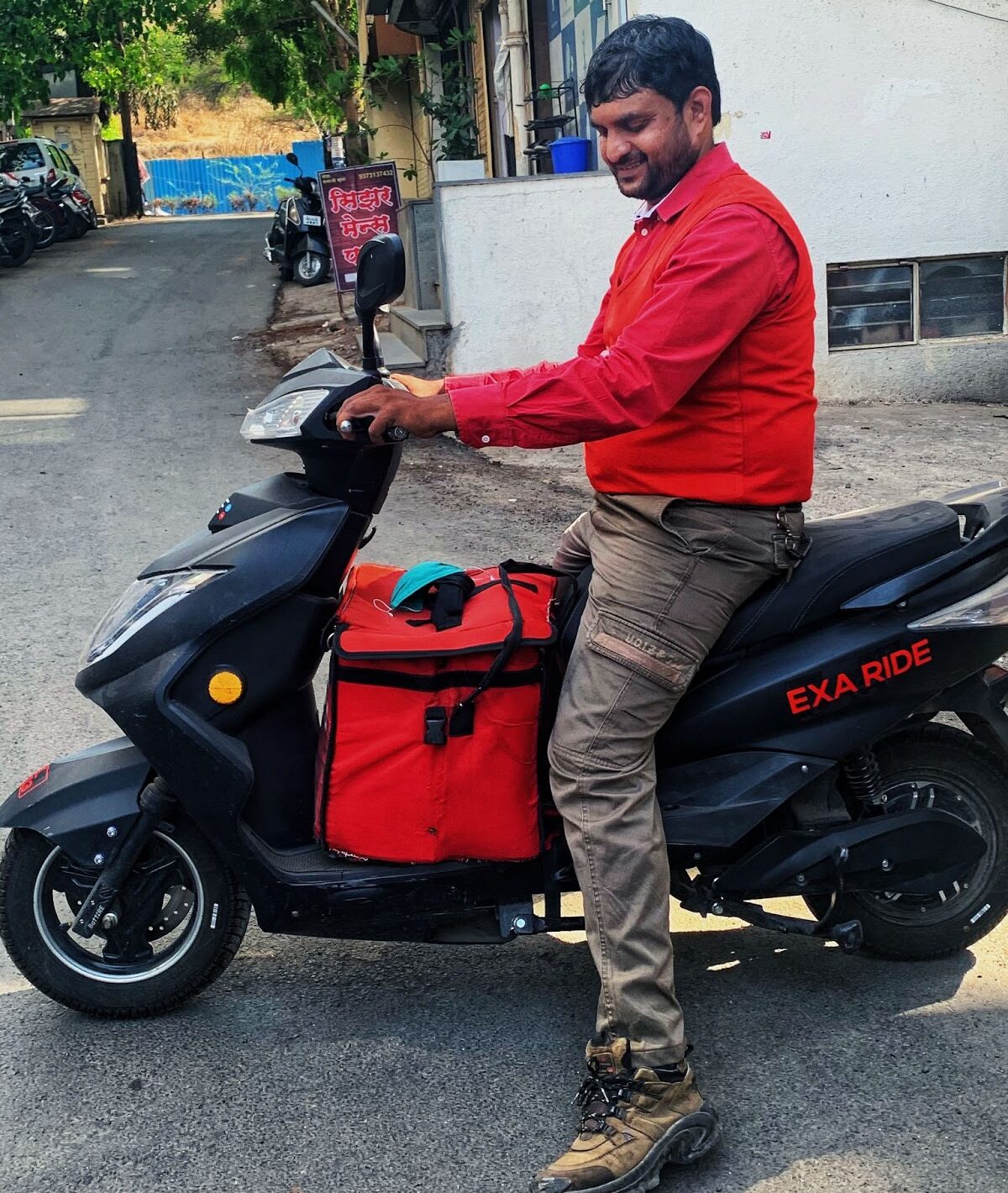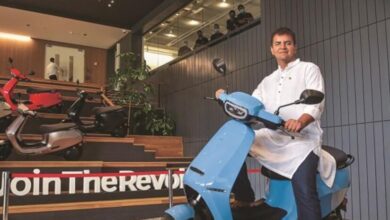Startup Mantra for 2021: Making business greener and effective by electrifying mobility.

In 2018, Sanchek Pilane founded his startup Exa Mobility with the long-term vision of “Mobility-as-a-Service” (MaaS), driven by his passion for doing something new.
Two years of research and development in the electric vehicle space were not enough to win over investors.
Afterwards, there was an outbreak of Covid-19 and subsequent lockdowns. Pilane did not give up in the face of obstacles, pivoted his business model, and is now cash-flow positive.
At the beginning of the business
College of Engineering and Technology of Pune Vidhyarthi Griha is where Pilane received his mechanical engineering degree. “I wanted a different approach,” explains Pilane. I initially aspired to become a scientist, but later decided to pursue my engineering degree and enter this exciting industry.”
Sustainable energy has piqued my interest. Our college team competed in an electric vehicle competition when we were in our third year of engineering. At that time, we built a working electric bike prototype. My team had won that competition, and I served as vice-captain.
As we were participating in such an event for the first time, there was no team to guide us. Our team placed top 10 in another Mahindra national competition. This convinced me that electric vehicles are the future. That was when Pilane decided to enter the EV space.
Starting out
Pilane’s family wanted him to gain experience and start a business after completing his engineering education in 2017. The engineer, however, thought this would be a waste of time. “I decided to gain more experience with my startup in India instead of investing a couple of years and lakhs of rupees in higher education abroad. Since my college days, I have wanted to utilize my expertise in product development, and my family also supports me. Thankfully, my decision has proven to be the right one,” Pilane says.
A bumpy ride
According to Pilane, “Exa Mobility was founded in June 2018. In March 2019, they created their first electric scooter prototype. It was our goal to develop something useful for our organization. As a result, our product was designed for the logistics needs of commercial fleets and not for average consumers.
The first challenge Pilane faced was building the team. In a few months, my college friend left to further his education after being employed for a few months. Recruitment was a challenge, and neither of us had a strong business or IIT background. Finding and hiring candidates was challenging. A second employee joined our team in August. Initially, we had four members.”

The Covid-19 hits
In February 2020, Exa Mobility attended the College of Engineering Pune (COEP) Startup Fest. The team received a positive response from investors and was ranked among the top 10. It is expected that we will raise between $30 lakh and $1 crore. In addition, investors felt that the prototype needed to be developed more and generate more traction. Specifically, they wanted us to have 50 vehicles on the road at once. Although disappointed, we were determined to fulfil their request. “The Covid-19 outbreak, however, lost any investor interest we had garnered following that,” Pilane said.
“We didn’t know what effects the pandemic would have. During the lockdown, we didn’t expect it to last so long. We kept on hiring until August 2020. Upon completion of our second prototype, we had an extended range and more aerodynamic design. In the meantime, the financial crisis had begun. Pilane claims that after laying off employees till December 2020, the team stabilized.
Pivot point
Pilane learned his lessons the hard way after relying heavily on research and the development of products. To generate revenue, Pilane’s team began renting out electric bicycles.
To generate revenue for our company, we developed an app called Exa Ride for shared mobility services. In our first wave, we targeted the IT crowd. However, during the second wave, we were also hit on this side of the market. My disappointment led me to think about closing the company at that time. The company ordered seven EVs for their logistics and delivery services from an e-commerce company through a vendor contact. “In May of this year, we had 80 vehicles running on a rental basis on the road as a result of a considerable turn of events,” Pilane stated.
Providing mobility as a service
Pilane explains: “Mobility as a Service is designed to disrupt the way people and goods move from point A to point B. As a shared electric vehicle company, we plan to provide a next-generation urban commute system. “We envision a transportation system integrating sustainable mobility at system-level.”
The vehicle is also pending multiple patent applications. This is an entirely new product. As part of the Autonomous, Connected, Electric, Shared (ACES) Mobility program, Software Technology Parks of India (STPI) is bringing us into the MOTION Center of Entrepreneurship (CoE).
A complete R&D facility provides start-ups working in autonomous, connected, electric mobility with state-of-the-art incubation capabilities. It offers innovative infrastructure, technology, leaders, mentoring, training, funding and networking for target focus areas.
Unique selling point
Pilane and his team developed a novel business model. In addition to renting electric vehicles to B2B clients, Exa Mobility owns only 20 of the total fleet of 90 vehicles, and investors are responsible for the remaining 80. Any individual who wants to fund the purchase of EVs and make a profit can be one of these investors.
To approach ‘investors’ for financing, we use digital marketing. The first investor we received from our advertisement was a mobile shop owner in May 2021. For example, the investor receives a monthly payment of $2,700 for a vehicle worth $70,00. As collateral, the investor owns the car. Pilane explains that at about 21 per cent compound interest, the individual receives *1.24 lakh in three years and ownership is then acquired by Exa Mobility.
Currently, we’ve financed 55 vehicles using this business model, and things are going well. According to their offerings for different customer segments, we purchase the vehicles for the rental model from Hero Electric, BATTRE (Delhi) and PureEV (Hyderabad). On rental models, we receive Rs4,000 per month and maintenance and other charges from the financed car. From day one, we are profitable, says Pilane.
Despite our talks with some colleges, no vehicles have yet been deployed on their campuses. The proposal states that colleges would provide us with parking spaces and charging infrastructure on their campuses. Their students and staff would be able to utilize our vehicles on campus. The college students of Bharati Vidyapeeth operated our cars at a rate of ₹250 per hour. It was through Exa Ride that we got our first customers. Currently, we only cater to B2B customers and charge between Rs4,000 and Rs5,000 a month.
KYC must be strong for business
“To mitigate the risks associated with electric vehicle rentals, we have implemented a very strong Know Your Customer (KYC) process,” explains Pilane. A daily fee of $400 applies to individuals. We verify the Aadhar number of the user from a database using the number from the Aadhar card. Additionally, we take a picture of the user with their vehicle. The deposit for cars has recently been increased to $4,000. Every one of our vehicles is insured in case of an accident. Over and above the approved insurance amount, any expenses incurred by the user are recovered.”
Plans for future expansion
By March 2022, Pilane says he plans to have 1,000 vehicles on the road for rent. Specifically, he aims to have 1,000 cars for the logistics segment. For the B2B segment, Pune needs 500 EVs immediately. By offering end-to-end logistics services, we want to explore the $220 billion logistics industry. Currently, we do not serve the IT sector and the student market.”

Our goal is to explore the first mile and last mile connectivity of the Pune Metro. Using this model would require extensive human resources over the next six months, as it is heavily operational. We will launch our vehicle in about two years, and we will need between 50 and 100 crores for the development of the factory. Eventually, we hope to introduce autonomous vehicles in 2030. Pilane indicates that the trucking industry has a lot of potential in this particular area.
In business, what and when to do.
A scooter was almost stolen during the second lockdown in April 2021. The customer had exhausted the battery just before the lockdown. Therefore, he decided to leave it in the shop of a relative.
As soon as possible, we would proceed, and the manager would make sure it was charged. Even when the lockdown was announced the next day, we couldn’t get near the vehicle for several days because he forgot to charge it. Using GPS, we monitored the vehicle to ensure its safety. Upon arrival, our team did not find the vehicle, explains Pilane.
“People said they had never seen an electric scooter there when we enquired. An officer was contacted because the situation appeared suspicious. While they are en route, everyone has been urged to bring any information about our vehicle. In 15 minutes, one person told us where the bike was and said he hid the vehicle not to be stolen. The bike was recovered. Following that, we mostly prefer monthly subscriptions with strict KYC requirements. In addition, Pilane says that vehicle GPS tracking is also being conducted regularly.
Money talks
In addition to owning and operating a food joint, I work as a Facility Manager for a Pune-based IT company. I invested here mainly because of the enormous return of 24 per cent, and I was interested in the programme because of the fixed monthly payment. So far, I have financed five e-scooters, so my fixed income per month is $13,500, which is quite impressive. The e-scooters that I have invested in will belong to me. Vernon Cardozo, an investor, describes his investment as a vital asset-backed by a strong foundation.
Having retired, I opted for bank fixed deposits as my first choice. These are safe and reliable investments. FDs nowadays generate only 6% returns, which is why I wanted to invest a few of my savings somewhere else for higher returns. The monthly payments ensured me a return on my investment with Exa Mobility’s Vehicle Financing Program, and I always admire young people who do something futuristic and innovative,” said retired professor Anil Bibikar.
“I have been an Exa Ride customer for many years. Especially when you want to visit multiple places in the city, it is a great alternative to Ola or Uber Cab”, says Deepa Bargi, a working professional.
Competition to the business: eleRide, a Pune-based provider of electric vehicles

For electric two-wheelers in Pune, EleRide has introduced monthly subscription plans. The intelligent charging centres feature free insurance, maintenance, and a rechargeable battery. Any user can travel up to 100 kilometres on these electric two-wheelers. The service is available to both consumers and businesses.
Two new subscription plans, eleLite and elePrime, have been launched with prices ranging from *3,499 to *4,499 plus five charging stations and three eleRide EV service centres across Pune in areas like Shivajinagar, Viman Nagar, Vishrantwadi, Wakad and Pashan. With the eleRide website, Punekars can choose which two-wheelers they want, along with the subscription period, before they are delivered within two hours.
India’s transition to e-mobility will be led by two-wheelers, according to us. Customers will be able to own more innovative vehicles with our help. Niraj Kumar Mishra, Founder and CEO of eleRide, said that the company plans to expand its services throughout Mumbai, Hyderabad, and Bangalore.
edited and proofread by nikita sharma




